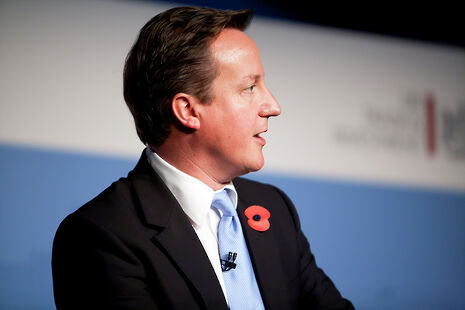Are we voting for MPs or the PM?
As the election draws near, Tom Day asks why the British public have so little say in who becomes the most powerful person in the country

The most basic principle of a democracy, and indeed the literal meaning of the word, is the rule of the people. Of course, modern states are too big to be governed by a direct democracy, as was the case in ancient Athens, and so we have modified this to a different version of democracy, which has come to be known as representative democracy. In this system, those who get the most votes from the general population represent them in Parliament, as MPs. However, one position which is not elected, in what seems a travesty of justice, is the Prime Minister. Who voted to make David Cameron the most powerful person in the country? Well, no-one did.
The system of representative democracy here reaches its biggest stumbling block. The electorate has no direct connection with the Prime Minister. This figure gains executive power by virtue of being the ‘leader’ of the most popular party. Why can’t the British public decide for themselves whom they want to invest with this enormous power? The votes of the electorate, who vote for local MPs, and the votes of the party members, who elect their leaders, are disproportionately weighted – so much more power for change lies in the hands of the Prime Minister than in those of any of the MPs.
The Prime Minister can override any local politician with a national policy, rendering local MPs far less significant. There are also significant problems, in that the local MP may be a member of a particular party, but perhaps also a rebel or a back-bencher, who does not agree with all of their leader’s policies. Should someone who cares about the country as a whole give their vote to this candidate, irrespective of their personal manifesto, if they support the nationwide political party? Similarly, one may have a particular liking towards a local candidate, but a disliking to his party leader. In both these situations, people are divided as to the best option, and in many cases two people at the same ballot box are voting for different things – one for the local MP and one for the Prime Minister.
Of course, the British constituency election system means that parties may only gain 30 per cent of the overall vote share, but still win an overall majority of seats, and the first-past-the-post system automatically favours the two major parties, to the extent that a party with an 8 per cent share of the vote will not win anywhere near a fifth of the seats of a party with 40 per cent of the vote. Thus, the national opinion about who should be in power is not represented in the executive.
Political parties are also responsible for convincing people that they have a say in who becomes Prime Minister – televised election debates, campaigns run by the party leaders and focusing on the potential Prime Ministerial candidates, all suggest to the public that they hold the balance of power. In actual fact, not one political party has gained over a 50 per cent vote share in any of the pre-election polls, and they are currently hovering at around 30 per cent each.
The Cabinet, as it stands, is made up of politicians from the Conservative party and the Liberal Democrat party. The opinion polls suggest that the next election is also likely to result in a hung parliament, so in all likelihood the Liberal Democrats, and other marginal parties like UKIP, the Greens, and regional parties from Scotland and Ireland will have a say in who becomes Prime Minister, and will probably be rewarded with seats in the executive.
All around the world, the electorate has a vote on whom they want to run their country. In Britain, the system is such that a party with a smaller proportion of the national vote could win an absolute majority. Could Britain not follow the model of several European nations, for example France, where Presidential elections are entirely separate from the elections for their Parliament? People can then focus on returning the candidates they want in their local seats, whilst knowing that they will also have a say in who leads the country.
The main problem associated with this type of vote is that it leads to the possibility of the election of a charismatic, but not necessarily politically astute, leader. In Britain, we may be concerned that in difficult times an extreme candidate, like Nigel Farage, may be successful. However, presidential elections all around the world demonstrate that this happens infrequently, and when it does, the inability of the elected party to form a government of his supporters means that another election will take place. The major benefit, of course, is that the public will have legitimately and directly elected the person they want to lead them, and this will also lead to clearer motivations in local elections – people will vote for their local candidates as opposed to the occupant of No. 10. This would actually prioritise local politics, rather than leave it in the background, as today’s general elections seem to do.
So, should we be voting for MPs or PM? Naturally, everyone must decide the answer to this question for themselves on the 7th May, but should this really be the way the most powerful person in the country is chosen?
You have one more day to register to vote here: gov.uk/register-to-vote. Voter registration closes on the 20th April 2015.
 News / Cambridge launches plan to bridge ‘town and gown’ divide27 October 2025
News / Cambridge launches plan to bridge ‘town and gown’ divide27 October 2025 News / Government announces £400m investment package for Cambridge25 October 2025
News / Government announces £400m investment package for Cambridge25 October 2025 News / SU announces vote on NUS affiliation17 October 2025
News / SU announces vote on NUS affiliation17 October 2025 News / Cambridge don appointed Reform adviser23 October 2025
News / Cambridge don appointed Reform adviser23 October 2025 Arts / Reflections on the Booker Prize 202528 October 2025
Arts / Reflections on the Booker Prize 202528 October 2025









